Business Environment Analysis Report - Vodafone Case Study
VerifiedAdded on 2020/07/22
|24
|7961
|70
Report
AI Summary
This report provides a comprehensive analysis of Vodafone's business environment. It delves into the purpose of different organizational types, focusing on private, public, government, voluntary, co-operative, and charity organizations. The report examines how Vodafone meets the objectives of various stakeholders, including owners, customers, suppliers, employees, debtors, creditors, financial institutions, environmental groups, and government agencies. It further explores Vodafone's organizational responsibilities and strategies for meeting objectives, including stakeholder interests, legal responsibilities, and environmental considerations. The report also analyzes economic systems, resource allocation, fiscal and monetary policies, competition policy, market structures, and the impact of international trade and European Union policies on Vodafone's operations. The analysis covers the determination of pricing and output decisions within market structures and how market forces shape organizational responses, alongside an examination of the cultural environment's influence on Vodafone's behavior.
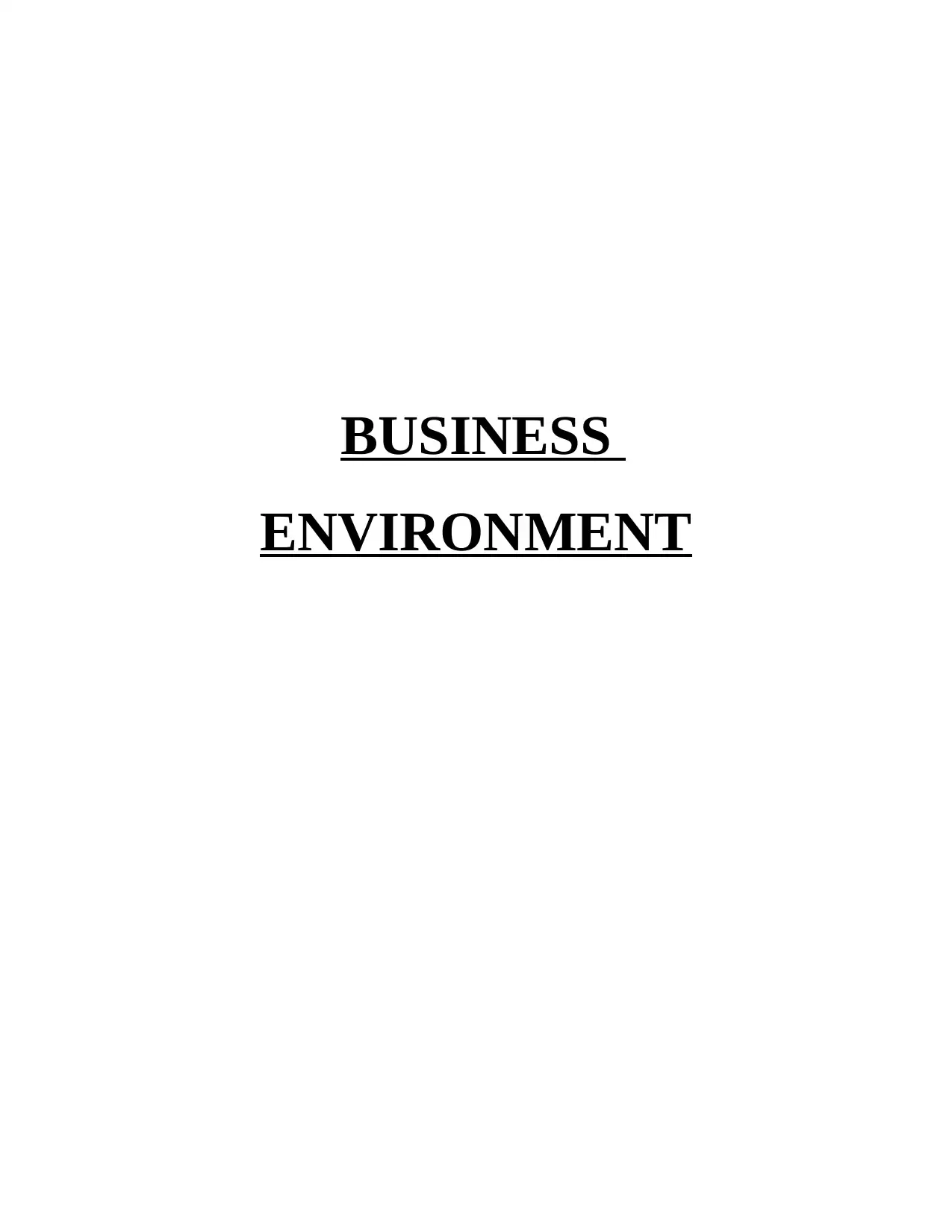
BUSINESS
ENVIRONMENT
ENVIRONMENT
Paraphrase This Document
Need a fresh take? Get an instant paraphrase of this document with our AI Paraphraser
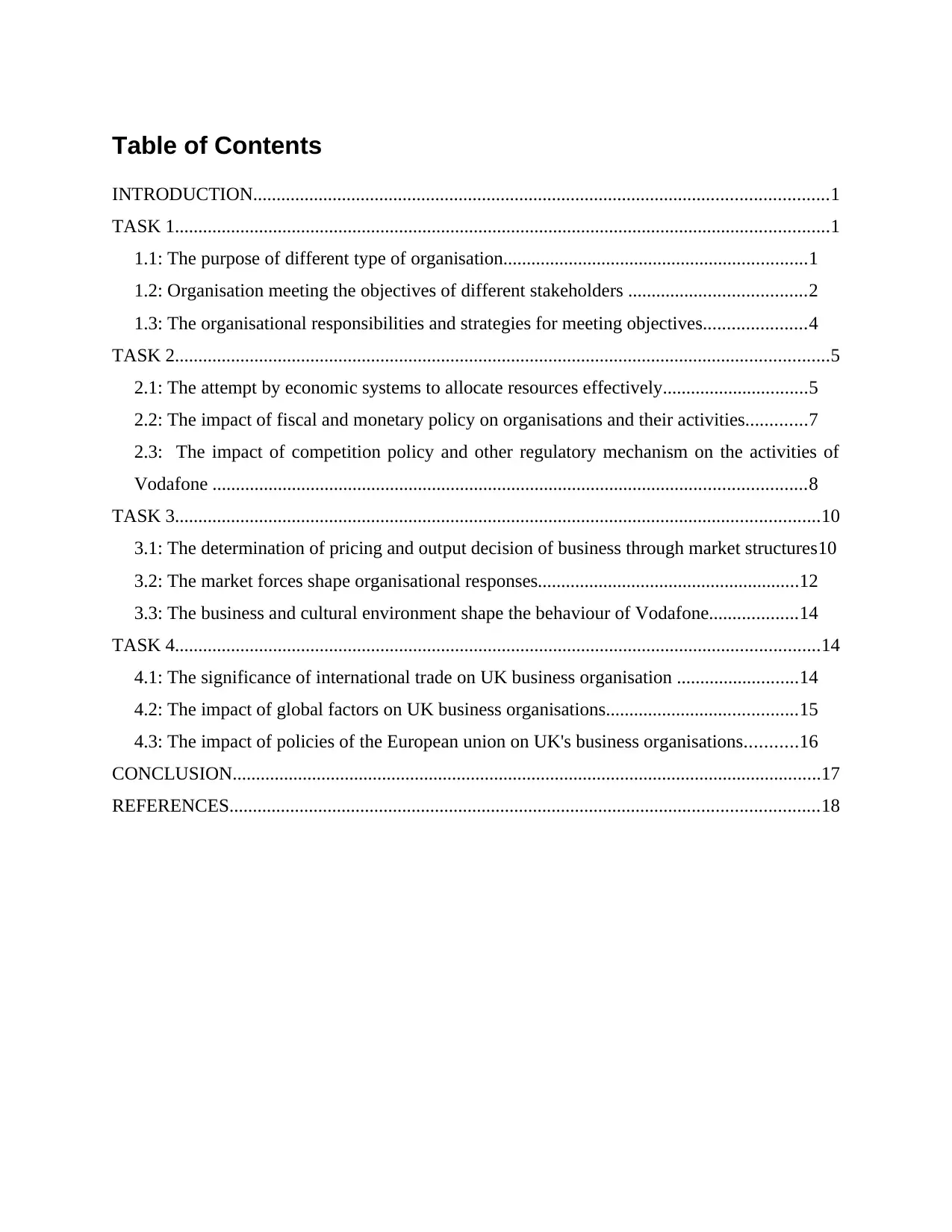
Table of Contents
INTRODUCTION...........................................................................................................................1
TASK 1............................................................................................................................................1
1.1: The purpose of different type of organisation.................................................................1
1.2: Organisation meeting the objectives of different stakeholders ......................................2
1.3: The organisational responsibilities and strategies for meeting objectives......................4
TASK 2............................................................................................................................................5
2.1: The attempt by economic systems to allocate resources effectively...............................5
2.2: The impact of fiscal and monetary policy on organisations and their activities.............7
2.3: The impact of competition policy and other regulatory mechanism on the activities of
Vodafone ...............................................................................................................................8
TASK 3..........................................................................................................................................10
3.1: The determination of pricing and output decision of business through market structures10
3.2: The market forces shape organisational responses........................................................12
3.3: The business and cultural environment shape the behaviour of Vodafone...................14
TASK 4..........................................................................................................................................14
4.1: The significance of international trade on UK business organisation ..........................14
4.2: The impact of global factors on UK business organisations.........................................15
4.3: The impact of policies of the European union on UK's business organisations...........16
CONCLUSION..............................................................................................................................17
REFERENCES..............................................................................................................................18
INTRODUCTION...........................................................................................................................1
TASK 1............................................................................................................................................1
1.1: The purpose of different type of organisation.................................................................1
1.2: Organisation meeting the objectives of different stakeholders ......................................2
1.3: The organisational responsibilities and strategies for meeting objectives......................4
TASK 2............................................................................................................................................5
2.1: The attempt by economic systems to allocate resources effectively...............................5
2.2: The impact of fiscal and monetary policy on organisations and their activities.............7
2.3: The impact of competition policy and other regulatory mechanism on the activities of
Vodafone ...............................................................................................................................8
TASK 3..........................................................................................................................................10
3.1: The determination of pricing and output decision of business through market structures10
3.2: The market forces shape organisational responses........................................................12
3.3: The business and cultural environment shape the behaviour of Vodafone...................14
TASK 4..........................................................................................................................................14
4.1: The significance of international trade on UK business organisation ..........................14
4.2: The impact of global factors on UK business organisations.........................................15
4.3: The impact of policies of the European union on UK's business organisations...........16
CONCLUSION..............................................................................................................................17
REFERENCES..............................................................................................................................18
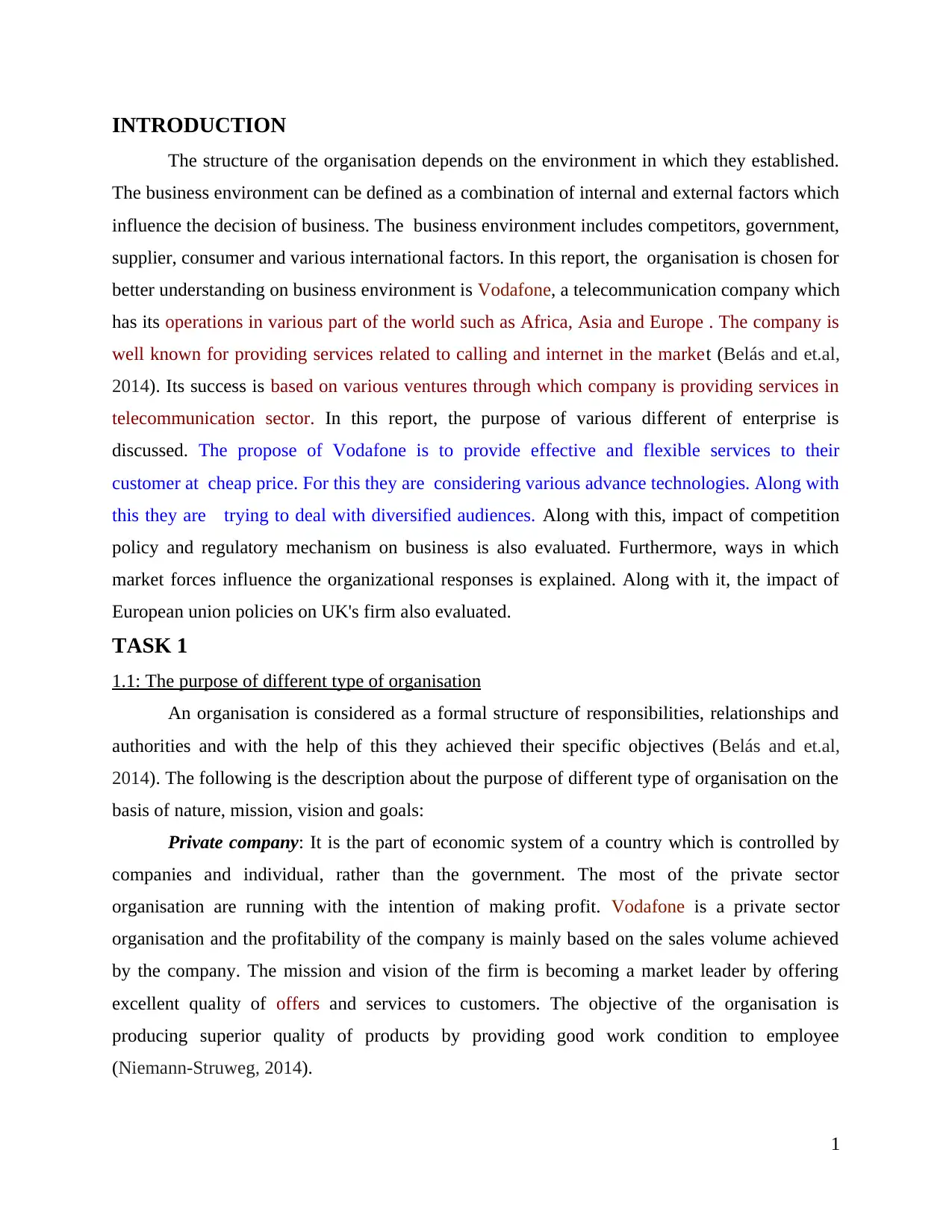
INTRODUCTION
The structure of the organisation depends on the environment in which they established.
The business environment can be defined as a combination of internal and external factors which
influence the decision of business. The business environment includes competitors, government,
supplier, consumer and various international factors. In this report, the organisation is chosen for
better understanding on business environment is Vodafone, a telecommunication company which
has its operations in various part of the world such as Africa, Asia and Europe . The company is
well known for providing services related to calling and internet in the market (Belás and et.al,
2014). Its success is based on various ventures through which company is providing services in
telecommunication sector. In this report, the purpose of various different of enterprise is
discussed. The propose of Vodafone is to provide effective and flexible services to their
customer at cheap price. For this they are considering various advance technologies. Along with
this they are trying to deal with diversified audiences. Along with this, impact of competition
policy and regulatory mechanism on business is also evaluated. Furthermore, ways in which
market forces influence the organizational responses is explained. Along with it, the impact of
European union policies on UK's firm also evaluated.
TASK 1
1.1: The purpose of different type of organisation
An organisation is considered as a formal structure of responsibilities, relationships and
authorities and with the help of this they achieved their specific objectives (Belás and et.al,
2014). The following is the description about the purpose of different type of organisation on the
basis of nature, mission, vision and goals:
Private company: It is the part of economic system of a country which is controlled by
companies and individual, rather than the government. The most of the private sector
organisation are running with the intention of making profit. Vodafone is a private sector
organisation and the profitability of the company is mainly based on the sales volume achieved
by the company. The mission and vision of the firm is becoming a market leader by offering
excellent quality of offers and services to customers. The objective of the organisation is
producing superior quality of products by providing good work condition to employee
(Niemann-Struweg, 2014).
1
The structure of the organisation depends on the environment in which they established.
The business environment can be defined as a combination of internal and external factors which
influence the decision of business. The business environment includes competitors, government,
supplier, consumer and various international factors. In this report, the organisation is chosen for
better understanding on business environment is Vodafone, a telecommunication company which
has its operations in various part of the world such as Africa, Asia and Europe . The company is
well known for providing services related to calling and internet in the market (Belás and et.al,
2014). Its success is based on various ventures through which company is providing services in
telecommunication sector. In this report, the purpose of various different of enterprise is
discussed. The propose of Vodafone is to provide effective and flexible services to their
customer at cheap price. For this they are considering various advance technologies. Along with
this they are trying to deal with diversified audiences. Along with this, impact of competition
policy and regulatory mechanism on business is also evaluated. Furthermore, ways in which
market forces influence the organizational responses is explained. Along with it, the impact of
European union policies on UK's firm also evaluated.
TASK 1
1.1: The purpose of different type of organisation
An organisation is considered as a formal structure of responsibilities, relationships and
authorities and with the help of this they achieved their specific objectives (Belás and et.al,
2014). The following is the description about the purpose of different type of organisation on the
basis of nature, mission, vision and goals:
Private company: It is the part of economic system of a country which is controlled by
companies and individual, rather than the government. The most of the private sector
organisation are running with the intention of making profit. Vodafone is a private sector
organisation and the profitability of the company is mainly based on the sales volume achieved
by the company. The mission and vision of the firm is becoming a market leader by offering
excellent quality of offers and services to customers. The objective of the organisation is
producing superior quality of products by providing good work condition to employee
(Niemann-Struweg, 2014).
1
⊘ This is a preview!⊘
Do you want full access?
Subscribe today to unlock all pages.

Trusted by 1+ million students worldwide
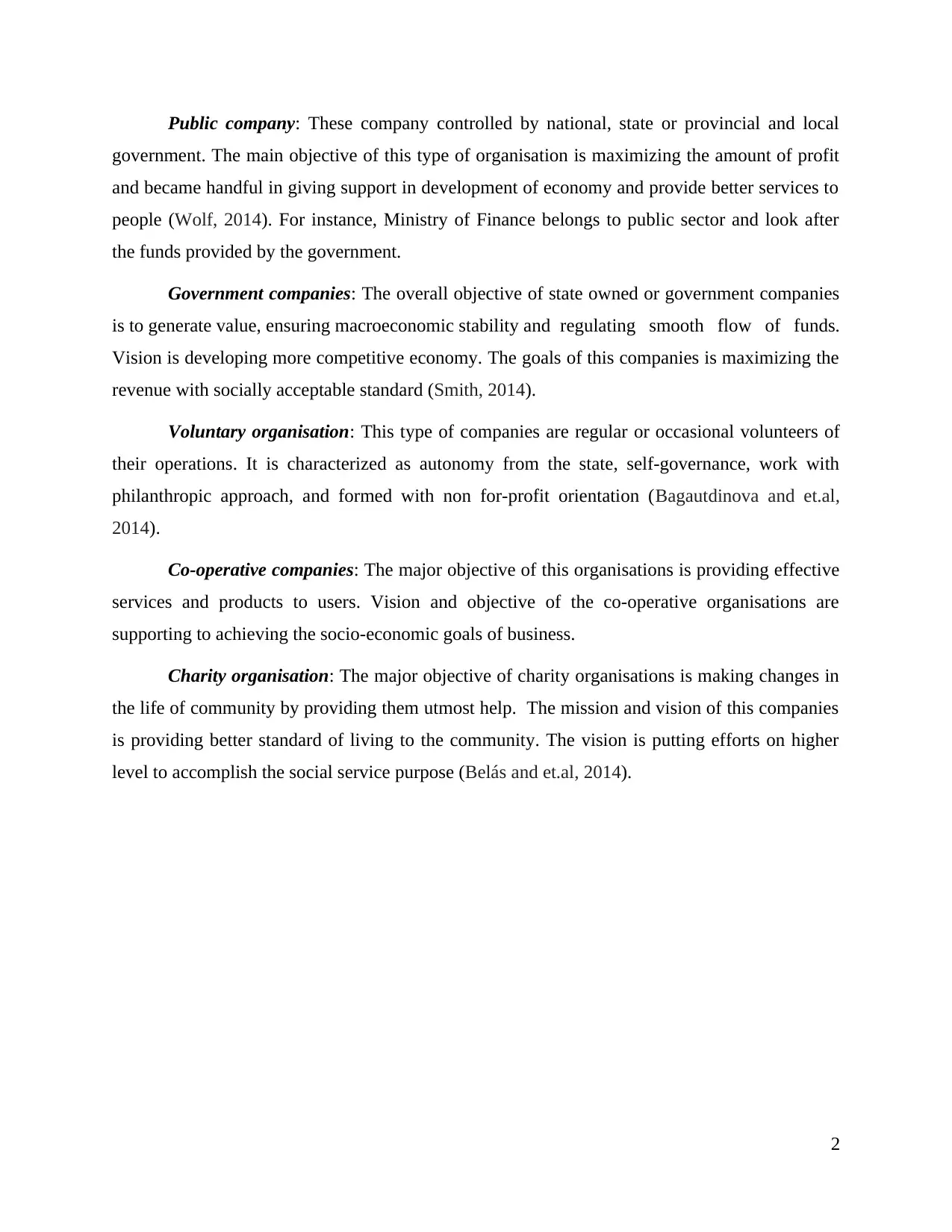
Public company: These company controlled by national, state or provincial and local
government. The main objective of this type of organisation is maximizing the amount of profit
and became handful in giving support in development of economy and provide better services to
people (Wolf, 2014). For instance, Ministry of Finance belongs to public sector and look after
the funds provided by the government.
Government companies: The overall objective of state owned or government companies
is to generate value, ensuring macroeconomic stability and regulating smooth flow of funds.
Vision is developing more competitive economy. The goals of this companies is maximizing the
revenue with socially acceptable standard (Smith, 2014).
Voluntary organisation: This type of companies are regular or occasional volunteers of
their operations. It is characterized as autonomy from the state, self-governance, work with
philanthropic approach, and formed with non for-profit orientation (Bagautdinova and et.al,
2014).
Co-operative companies: The major objective of this organisations is providing effective
services and products to users. Vision and objective of the co-operative organisations are
supporting to achieving the socio-economic goals of business.
Charity organisation: The major objective of charity organisations is making changes in
the life of community by providing them utmost help. The mission and vision of this companies
is providing better standard of living to the community. The vision is putting efforts on higher
level to accomplish the social service purpose (Belás and et.al, 2014).
2
government. The main objective of this type of organisation is maximizing the amount of profit
and became handful in giving support in development of economy and provide better services to
people (Wolf, 2014). For instance, Ministry of Finance belongs to public sector and look after
the funds provided by the government.
Government companies: The overall objective of state owned or government companies
is to generate value, ensuring macroeconomic stability and regulating smooth flow of funds.
Vision is developing more competitive economy. The goals of this companies is maximizing the
revenue with socially acceptable standard (Smith, 2014).
Voluntary organisation: This type of companies are regular or occasional volunteers of
their operations. It is characterized as autonomy from the state, self-governance, work with
philanthropic approach, and formed with non for-profit orientation (Bagautdinova and et.al,
2014).
Co-operative companies: The major objective of this organisations is providing effective
services and products to users. Vision and objective of the co-operative organisations are
supporting to achieving the socio-economic goals of business.
Charity organisation: The major objective of charity organisations is making changes in
the life of community by providing them utmost help. The mission and vision of this companies
is providing better standard of living to the community. The vision is putting efforts on higher
level to accomplish the social service purpose (Belás and et.al, 2014).
2
Paraphrase This Document
Need a fresh take? Get an instant paraphrase of this document with our AI Paraphraser
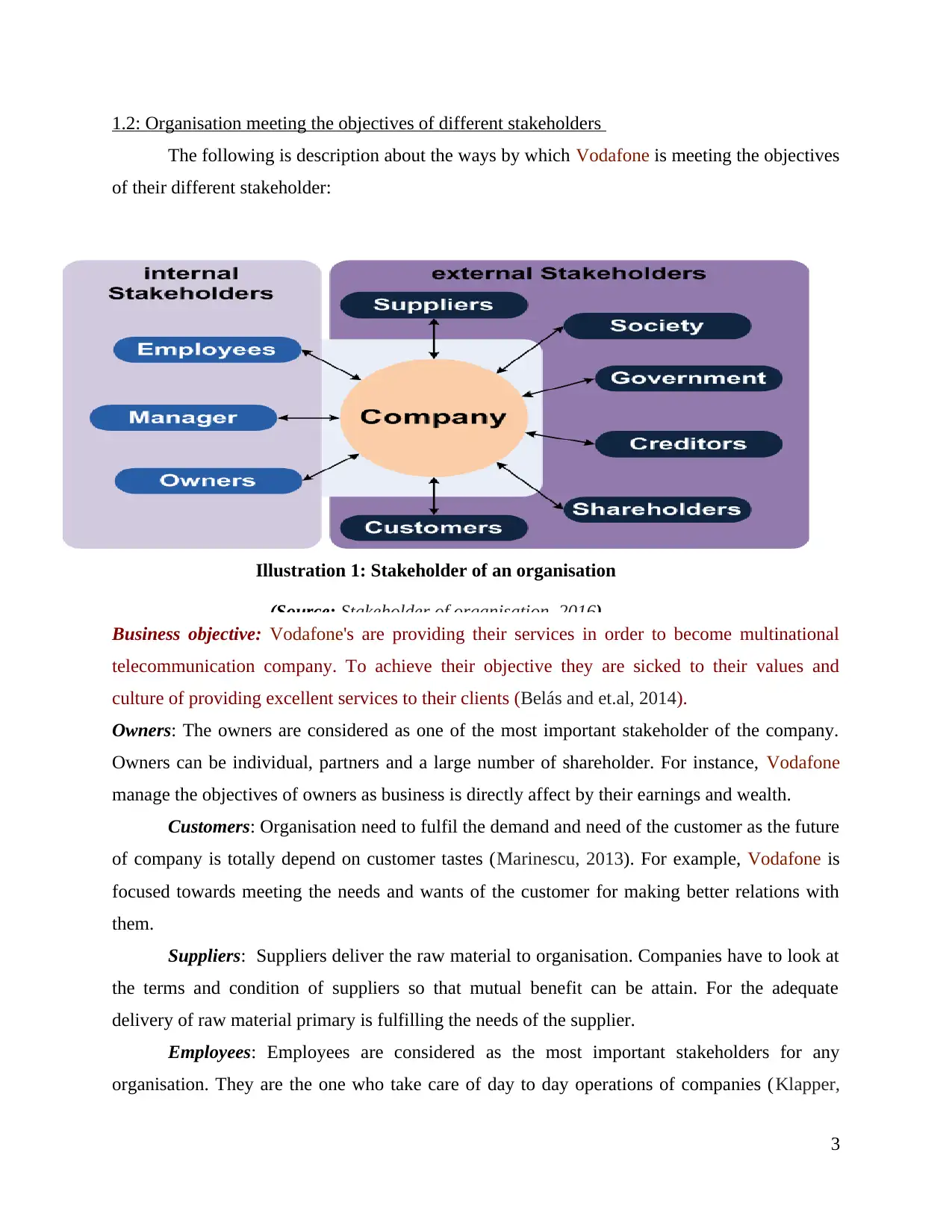
1.2: Organisation meeting the objectives of different stakeholders
The following is description about the ways by which Vodafone is meeting the objectives
of their different stakeholder:
Business objective: Vodafone's are providing their services in order to become multinational
telecommunication company. To achieve their objective they are sicked to their values and
culture of providing excellent services to their clients (Belás and et.al, 2014).
Owners: The owners are considered as one of the most important stakeholder of the company.
Owners can be individual, partners and a large number of shareholder. For instance, Vodafone
manage the objectives of owners as business is directly affect by their earnings and wealth.
Customers: Organisation need to fulfil the demand and need of the customer as the future
of company is totally depend on customer tastes (Marinescu, 2013). For example, Vodafone is
focused towards meeting the needs and wants of the customer for making better relations with
them.
Suppliers: Suppliers deliver the raw material to organisation. Companies have to look at
the terms and condition of suppliers so that mutual benefit can be attain. For the adequate
delivery of raw material primary is fulfilling the needs of the supplier.
Employees: Employees are considered as the most important stakeholders for any
organisation. They are the one who take care of day to day operations of companies (Klapper,
3
Illustration 1: Stakeholder of an organisation
(Source: Stakeholder of organisation. 2016)
The following is description about the ways by which Vodafone is meeting the objectives
of their different stakeholder:
Business objective: Vodafone's are providing their services in order to become multinational
telecommunication company. To achieve their objective they are sicked to their values and
culture of providing excellent services to their clients (Belás and et.al, 2014).
Owners: The owners are considered as one of the most important stakeholder of the company.
Owners can be individual, partners and a large number of shareholder. For instance, Vodafone
manage the objectives of owners as business is directly affect by their earnings and wealth.
Customers: Organisation need to fulfil the demand and need of the customer as the future
of company is totally depend on customer tastes (Marinescu, 2013). For example, Vodafone is
focused towards meeting the needs and wants of the customer for making better relations with
them.
Suppliers: Suppliers deliver the raw material to organisation. Companies have to look at
the terms and condition of suppliers so that mutual benefit can be attain. For the adequate
delivery of raw material primary is fulfilling the needs of the supplier.
Employees: Employees are considered as the most important stakeholders for any
organisation. They are the one who take care of day to day operations of companies (Klapper,
3
Illustration 1: Stakeholder of an organisation
(Source: Stakeholder of organisation. 2016)
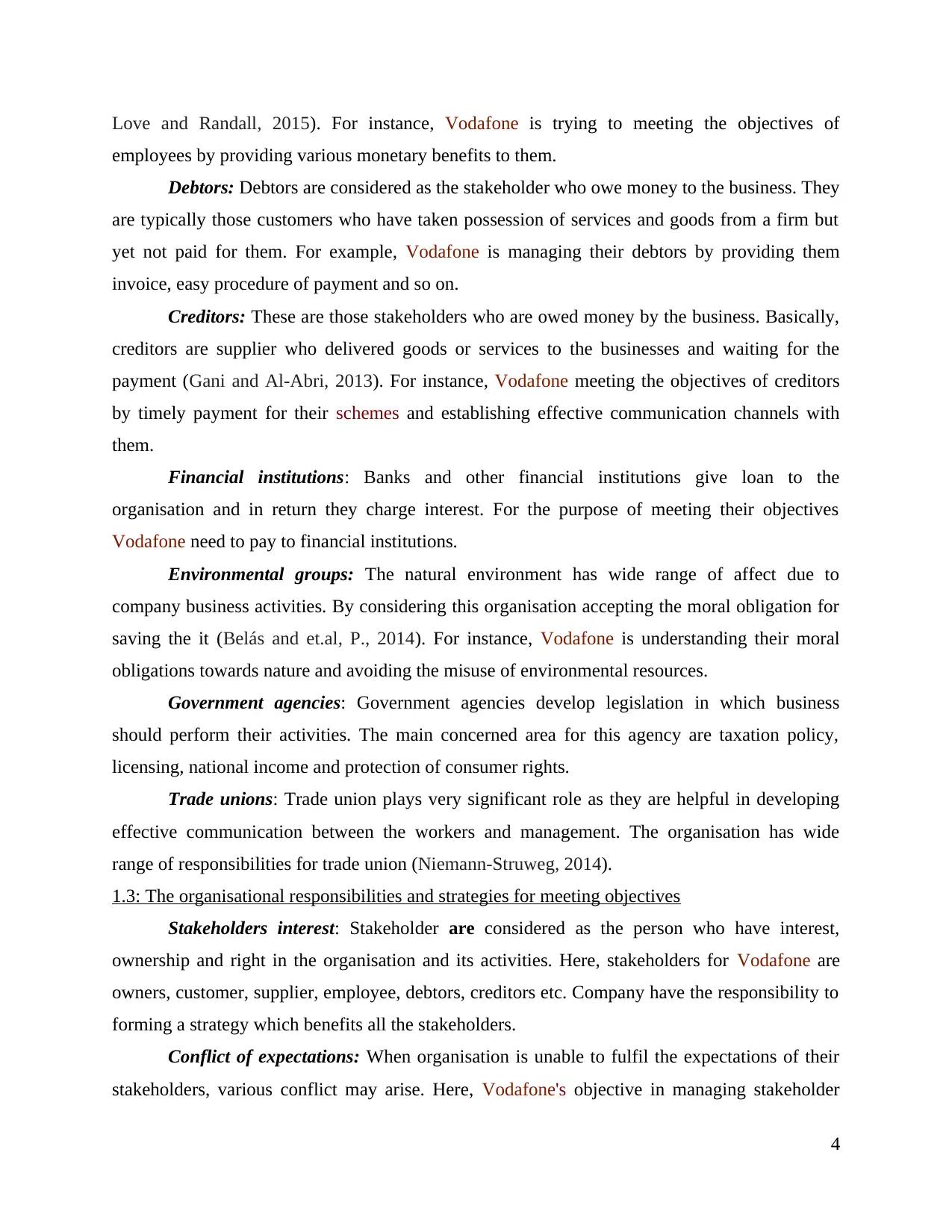
Love and Randall, 2015). For instance, Vodafone is trying to meeting the objectives of
employees by providing various monetary benefits to them.
Debtors: Debtors are considered as the stakeholder who owe money to the business. They
are typically those customers who have taken possession of services and goods from a firm but
yet not paid for them. For example, Vodafone is managing their debtors by providing them
invoice, easy procedure of payment and so on.
Creditors: These are those stakeholders who are owed money by the business. Basically,
creditors are supplier who delivered goods or services to the businesses and waiting for the
payment (Gani and Al-Abri, 2013). For instance, Vodafone meeting the objectives of creditors
by timely payment for their schemes and establishing effective communication channels with
them.
Financial institutions: Banks and other financial institutions give loan to the
organisation and in return they charge interest. For the purpose of meeting their objectives
Vodafone need to pay to financial institutions.
Environmental groups: The natural environment has wide range of affect due to
company business activities. By considering this organisation accepting the moral obligation for
saving the it (Belás and et.al, P., 2014). For instance, Vodafone is understanding their moral
obligations towards nature and avoiding the misuse of environmental resources.
Government agencies: Government agencies develop legislation in which business
should perform their activities. The main concerned area for this agency are taxation policy,
licensing, national income and protection of consumer rights.
Trade unions: Trade union plays very significant role as they are helpful in developing
effective communication between the workers and management. The organisation has wide
range of responsibilities for trade union (Niemann-Struweg, 2014).
1.3: The organisational responsibilities and strategies for meeting objectives
Stakeholders interest: Stakeholder are considered as the person who have interest,
ownership and right in the organisation and its activities. Here, stakeholders for Vodafone are
owners, customer, supplier, employee, debtors, creditors etc. Company have the responsibility to
forming a strategy which benefits all the stakeholders.
Conflict of expectations: When organisation is unable to fulfil the expectations of their
stakeholders, various conflict may arise. Here, Vodafone's objective in managing stakeholder
4
employees by providing various monetary benefits to them.
Debtors: Debtors are considered as the stakeholder who owe money to the business. They
are typically those customers who have taken possession of services and goods from a firm but
yet not paid for them. For example, Vodafone is managing their debtors by providing them
invoice, easy procedure of payment and so on.
Creditors: These are those stakeholders who are owed money by the business. Basically,
creditors are supplier who delivered goods or services to the businesses and waiting for the
payment (Gani and Al-Abri, 2013). For instance, Vodafone meeting the objectives of creditors
by timely payment for their schemes and establishing effective communication channels with
them.
Financial institutions: Banks and other financial institutions give loan to the
organisation and in return they charge interest. For the purpose of meeting their objectives
Vodafone need to pay to financial institutions.
Environmental groups: The natural environment has wide range of affect due to
company business activities. By considering this organisation accepting the moral obligation for
saving the it (Belás and et.al, P., 2014). For instance, Vodafone is understanding their moral
obligations towards nature and avoiding the misuse of environmental resources.
Government agencies: Government agencies develop legislation in which business
should perform their activities. The main concerned area for this agency are taxation policy,
licensing, national income and protection of consumer rights.
Trade unions: Trade union plays very significant role as they are helpful in developing
effective communication between the workers and management. The organisation has wide
range of responsibilities for trade union (Niemann-Struweg, 2014).
1.3: The organisational responsibilities and strategies for meeting objectives
Stakeholders interest: Stakeholder are considered as the person who have interest,
ownership and right in the organisation and its activities. Here, stakeholders for Vodafone are
owners, customer, supplier, employee, debtors, creditors etc. Company have the responsibility to
forming a strategy which benefits all the stakeholders.
Conflict of expectations: When organisation is unable to fulfil the expectations of their
stakeholders, various conflict may arise. Here, Vodafone's objective in managing stakeholder
4
⊘ This is a preview!⊘
Do you want full access?
Subscribe today to unlock all pages.

Trusted by 1+ million students worldwide
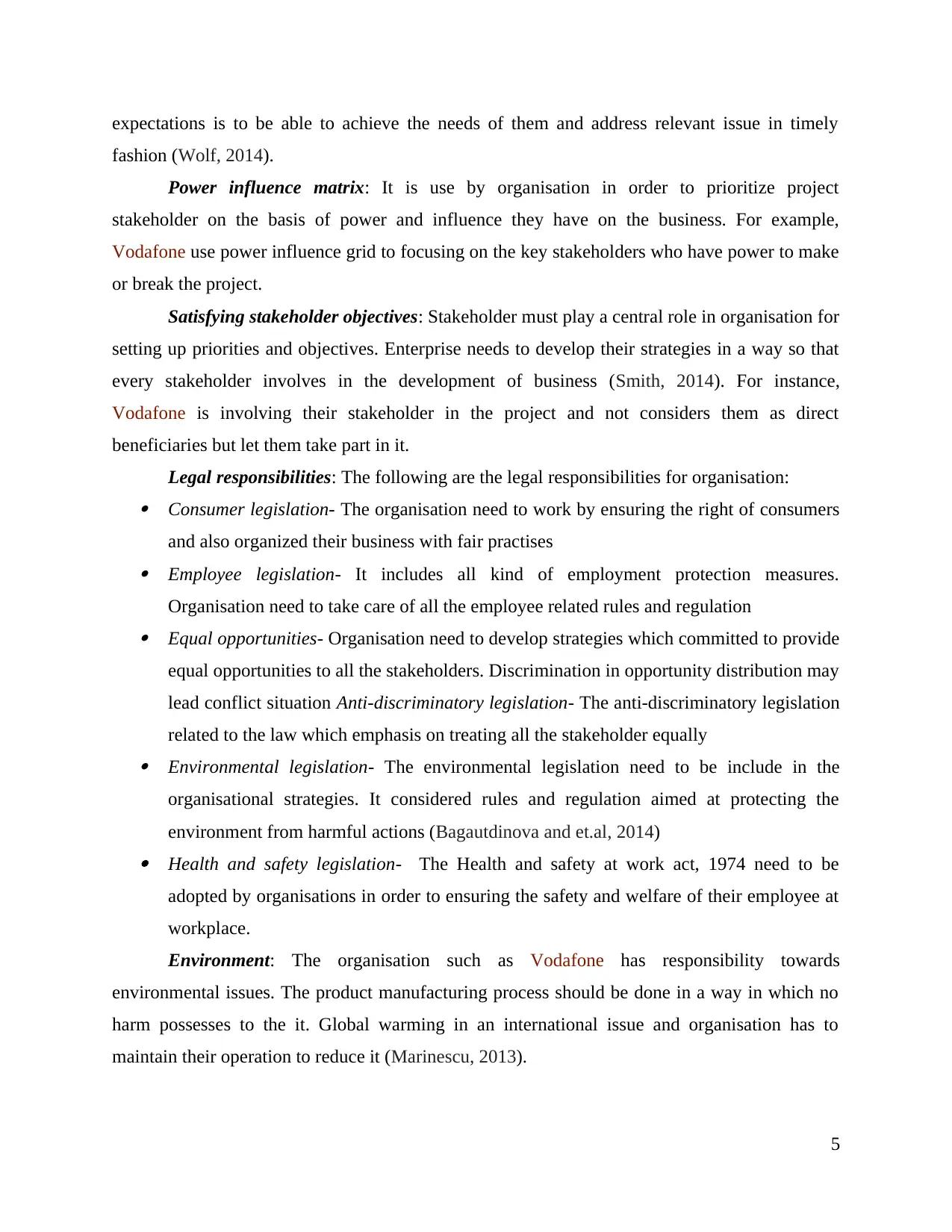
expectations is to be able to achieve the needs of them and address relevant issue in timely
fashion (Wolf, 2014).
Power influence matrix: It is use by organisation in order to prioritize project
stakeholder on the basis of power and influence they have on the business. For example,
Vodafone use power influence grid to focusing on the key stakeholders who have power to make
or break the project.
Satisfying stakeholder objectives: Stakeholder must play a central role in organisation for
setting up priorities and objectives. Enterprise needs to develop their strategies in a way so that
every stakeholder involves in the development of business (Smith, 2014). For instance,
Vodafone is involving their stakeholder in the project and not considers them as direct
beneficiaries but let them take part in it.
Legal responsibilities: The following are the legal responsibilities for organisation: Consumer legislation- The organisation need to work by ensuring the right of consumers
and also organized their business with fair practises Employee legislation- It includes all kind of employment protection measures.
Organisation need to take care of all the employee related rules and regulation Equal opportunities- Organisation need to develop strategies which committed to provide
equal opportunities to all the stakeholders. Discrimination in opportunity distribution may
lead conflict situation Anti-discriminatory legislation- The anti-discriminatory legislation
related to the law which emphasis on treating all the stakeholder equally Environmental legislation- The environmental legislation need to be include in the
organisational strategies. It considered rules and regulation aimed at protecting the
environment from harmful actions (Bagautdinova and et.al, 2014) Health and safety legislation- The Health and safety at work act, 1974 need to be
adopted by organisations in order to ensuring the safety and welfare of their employee at
workplace.
Environment: The organisation such as Vodafone has responsibility towards
environmental issues. The product manufacturing process should be done in a way in which no
harm possesses to the it. Global warming in an international issue and organisation has to
maintain their operation to reduce it (Marinescu, 2013).
5
fashion (Wolf, 2014).
Power influence matrix: It is use by organisation in order to prioritize project
stakeholder on the basis of power and influence they have on the business. For example,
Vodafone use power influence grid to focusing on the key stakeholders who have power to make
or break the project.
Satisfying stakeholder objectives: Stakeholder must play a central role in organisation for
setting up priorities and objectives. Enterprise needs to develop their strategies in a way so that
every stakeholder involves in the development of business (Smith, 2014). For instance,
Vodafone is involving their stakeholder in the project and not considers them as direct
beneficiaries but let them take part in it.
Legal responsibilities: The following are the legal responsibilities for organisation: Consumer legislation- The organisation need to work by ensuring the right of consumers
and also organized their business with fair practises Employee legislation- It includes all kind of employment protection measures.
Organisation need to take care of all the employee related rules and regulation Equal opportunities- Organisation need to develop strategies which committed to provide
equal opportunities to all the stakeholders. Discrimination in opportunity distribution may
lead conflict situation Anti-discriminatory legislation- The anti-discriminatory legislation
related to the law which emphasis on treating all the stakeholder equally Environmental legislation- The environmental legislation need to be include in the
organisational strategies. It considered rules and regulation aimed at protecting the
environment from harmful actions (Bagautdinova and et.al, 2014) Health and safety legislation- The Health and safety at work act, 1974 need to be
adopted by organisations in order to ensuring the safety and welfare of their employee at
workplace.
Environment: The organisation such as Vodafone has responsibility towards
environmental issues. The product manufacturing process should be done in a way in which no
harm possesses to the it. Global warming in an international issue and organisation has to
maintain their operation to reduce it (Marinescu, 2013).
5
Paraphrase This Document
Need a fresh take? Get an instant paraphrase of this document with our AI Paraphraser
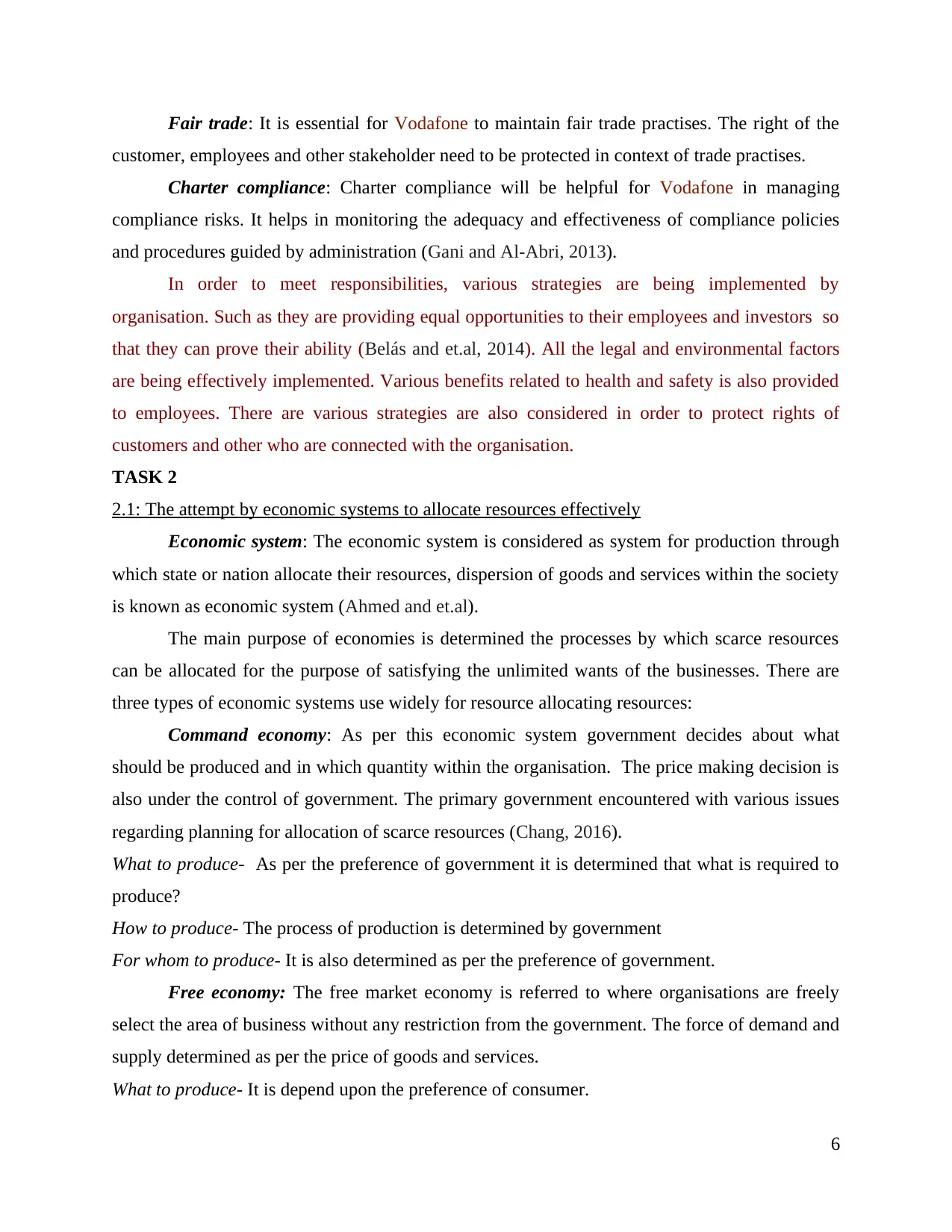
Fair trade: It is essential for Vodafone to maintain fair trade practises. The right of the
customer, employees and other stakeholder need to be protected in context of trade practises.
Charter compliance: Charter compliance will be helpful for Vodafone in managing
compliance risks. It helps in monitoring the adequacy and effectiveness of compliance policies
and procedures guided by administration (Gani and Al-Abri, 2013).
In order to meet responsibilities, various strategies are being implemented by
organisation. Such as they are providing equal opportunities to their employees and investors so
that they can prove their ability (Belás and et.al, 2014). All the legal and environmental factors
are being effectively implemented. Various benefits related to health and safety is also provided
to employees. There are various strategies are also considered in order to protect rights of
customers and other who are connected with the organisation.
TASK 2
2.1: The attempt by economic systems to allocate resources effectively
Economic system: The economic system is considered as system for production through
which state or nation allocate their resources, dispersion of goods and services within the society
is known as economic system (Ahmed and et.al).
The main purpose of economies is determined the processes by which scarce resources
can be allocated for the purpose of satisfying the unlimited wants of the businesses. There are
three types of economic systems use widely for resource allocating resources:
Command economy: As per this economic system government decides about what
should be produced and in which quantity within the organisation. The price making decision is
also under the control of government. The primary government encountered with various issues
regarding planning for allocation of scarce resources (Chang, 2016).
What to produce- As per the preference of government it is determined that what is required to
produce?
How to produce- The process of production is determined by government
For whom to produce- It is also determined as per the preference of government.
Free economy: The free market economy is referred to where organisations are freely
select the area of business without any restriction from the government. The force of demand and
supply determined as per the price of goods and services.
What to produce- It is depend upon the preference of consumer.
6
customer, employees and other stakeholder need to be protected in context of trade practises.
Charter compliance: Charter compliance will be helpful for Vodafone in managing
compliance risks. It helps in monitoring the adequacy and effectiveness of compliance policies
and procedures guided by administration (Gani and Al-Abri, 2013).
In order to meet responsibilities, various strategies are being implemented by
organisation. Such as they are providing equal opportunities to their employees and investors so
that they can prove their ability (Belás and et.al, 2014). All the legal and environmental factors
are being effectively implemented. Various benefits related to health and safety is also provided
to employees. There are various strategies are also considered in order to protect rights of
customers and other who are connected with the organisation.
TASK 2
2.1: The attempt by economic systems to allocate resources effectively
Economic system: The economic system is considered as system for production through
which state or nation allocate their resources, dispersion of goods and services within the society
is known as economic system (Ahmed and et.al).
The main purpose of economies is determined the processes by which scarce resources
can be allocated for the purpose of satisfying the unlimited wants of the businesses. There are
three types of economic systems use widely for resource allocating resources:
Command economy: As per this economic system government decides about what
should be produced and in which quantity within the organisation. The price making decision is
also under the control of government. The primary government encountered with various issues
regarding planning for allocation of scarce resources (Chang, 2016).
What to produce- As per the preference of government it is determined that what is required to
produce?
How to produce- The process of production is determined by government
For whom to produce- It is also determined as per the preference of government.
Free economy: The free market economy is referred to where organisations are freely
select the area of business without any restriction from the government. The force of demand and
supply determined as per the price of goods and services.
What to produce- It is depend upon the preference of consumer.
6
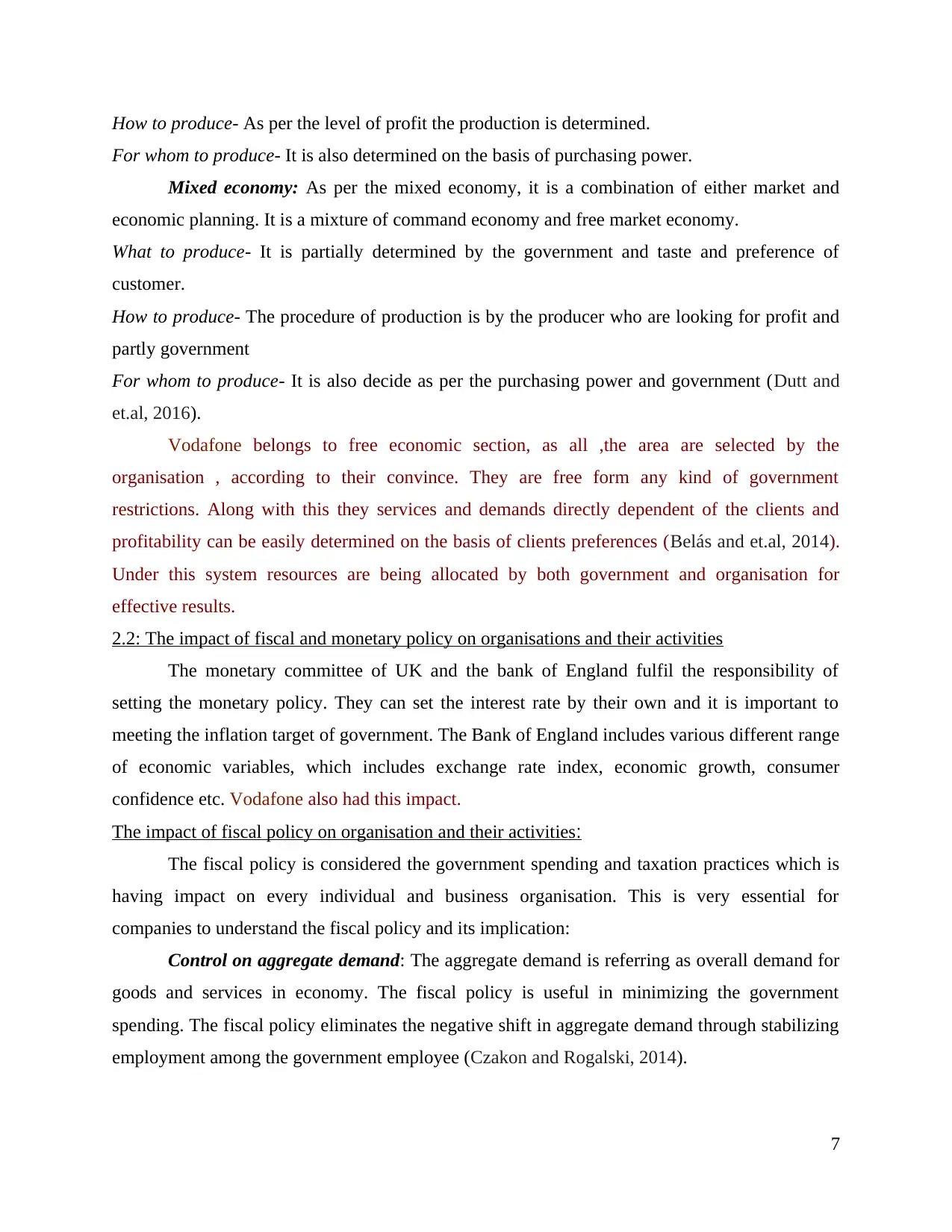
How to produce- As per the level of profit the production is determined.
For whom to produce- It is also determined on the basis of purchasing power.
Mixed economy: As per the mixed economy, it is a combination of either market and
economic planning. It is a mixture of command economy and free market economy.
What to produce- It is partially determined by the government and taste and preference of
customer.
How to produce- The procedure of production is by the producer who are looking for profit and
partly government
For whom to produce- It is also decide as per the purchasing power and government (Dutt and
et.al, 2016).
Vodafone belongs to free economic section, as all ,the area are selected by the
organisation , according to their convince. They are free form any kind of government
restrictions. Along with this they services and demands directly dependent of the clients and
profitability can be easily determined on the basis of clients preferences (Belás and et.al, 2014).
Under this system resources are being allocated by both government and organisation for
effective results.
2.2: The impact of fiscal and monetary policy on organisations and their activities
The monetary committee of UK and the bank of England fulfil the responsibility of
setting the monetary policy. They can set the interest rate by their own and it is important to
meeting the inflation target of government. The Bank of England includes various different range
of economic variables, which includes exchange rate index, economic growth, consumer
confidence etc. Vodafone also had this impact.
The impact of fiscal policy on organisation and their activities:
The fiscal policy is considered the government spending and taxation practices which is
having impact on every individual and business organisation. This is very essential for
companies to understand the fiscal policy and its implication:
Control on aggregate demand: The aggregate demand is referring as overall demand for
goods and services in economy. The fiscal policy is useful in minimizing the government
spending. The fiscal policy eliminates the negative shift in aggregate demand through stabilizing
employment among the government employee (Czakon and Rogalski, 2014).
7
For whom to produce- It is also determined on the basis of purchasing power.
Mixed economy: As per the mixed economy, it is a combination of either market and
economic planning. It is a mixture of command economy and free market economy.
What to produce- It is partially determined by the government and taste and preference of
customer.
How to produce- The procedure of production is by the producer who are looking for profit and
partly government
For whom to produce- It is also decide as per the purchasing power and government (Dutt and
et.al, 2016).
Vodafone belongs to free economic section, as all ,the area are selected by the
organisation , according to their convince. They are free form any kind of government
restrictions. Along with this they services and demands directly dependent of the clients and
profitability can be easily determined on the basis of clients preferences (Belás and et.al, 2014).
Under this system resources are being allocated by both government and organisation for
effective results.
2.2: The impact of fiscal and monetary policy on organisations and their activities
The monetary committee of UK and the bank of England fulfil the responsibility of
setting the monetary policy. They can set the interest rate by their own and it is important to
meeting the inflation target of government. The Bank of England includes various different range
of economic variables, which includes exchange rate index, economic growth, consumer
confidence etc. Vodafone also had this impact.
The impact of fiscal policy on organisation and their activities:
The fiscal policy is considered the government spending and taxation practices which is
having impact on every individual and business organisation. This is very essential for
companies to understand the fiscal policy and its implication:
Control on aggregate demand: The aggregate demand is referring as overall demand for
goods and services in economy. The fiscal policy is useful in minimizing the government
spending. The fiscal policy eliminates the negative shift in aggregate demand through stabilizing
employment among the government employee (Czakon and Rogalski, 2014).
7
⊘ This is a preview!⊘
Do you want full access?
Subscribe today to unlock all pages.

Trusted by 1+ million students worldwide
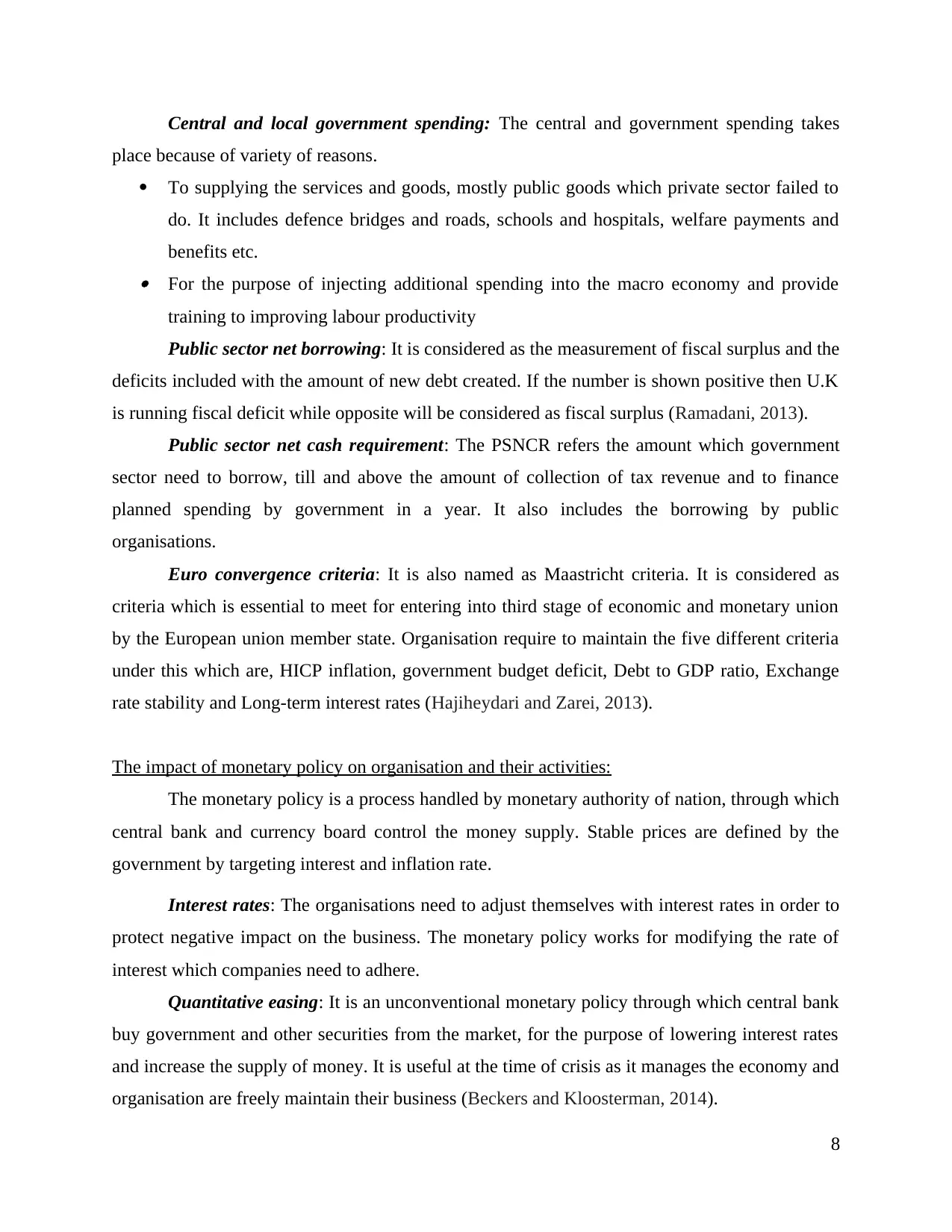
Central and local government spending: The central and government spending takes
place because of variety of reasons.
To supplying the services and goods, mostly public goods which private sector failed to
do. It includes defence bridges and roads, schools and hospitals, welfare payments and
benefits etc. For the purpose of injecting additional spending into the macro economy and provide
training to improving labour productivity
Public sector net borrowing: It is considered as the measurement of fiscal surplus and the
deficits included with the amount of new debt created. If the number is shown positive then U.K
is running fiscal deficit while opposite will be considered as fiscal surplus (Ramadani, 2013).
Public sector net cash requirement: The PSNCR refers the amount which government
sector need to borrow, till and above the amount of collection of tax revenue and to finance
planned spending by government in a year. It also includes the borrowing by public
organisations.
Euro convergence criteria: It is also named as Maastricht criteria. It is considered as
criteria which is essential to meet for entering into third stage of economic and monetary union
by the European union member state. Organisation require to maintain the five different criteria
under this which are, HICP inflation, government budget deficit, Debt to GDP ratio, Exchange
rate stability and Long-term interest rates (Hajiheydari and Zarei, 2013).
The impact of monetary policy on organisation and their activities:
The monetary policy is a process handled by monetary authority of nation, through which
central bank and currency board control the money supply. Stable prices are defined by the
government by targeting interest and inflation rate.
Interest rates: The organisations need to adjust themselves with interest rates in order to
protect negative impact on the business. The monetary policy works for modifying the rate of
interest which companies need to adhere.
Quantitative easing: It is an unconventional monetary policy through which central bank
buy government and other securities from the market, for the purpose of lowering interest rates
and increase the supply of money. It is useful at the time of crisis as it manages the economy and
organisation are freely maintain their business (Beckers and Kloosterman, 2014).
8
place because of variety of reasons.
To supplying the services and goods, mostly public goods which private sector failed to
do. It includes defence bridges and roads, schools and hospitals, welfare payments and
benefits etc. For the purpose of injecting additional spending into the macro economy and provide
training to improving labour productivity
Public sector net borrowing: It is considered as the measurement of fiscal surplus and the
deficits included with the amount of new debt created. If the number is shown positive then U.K
is running fiscal deficit while opposite will be considered as fiscal surplus (Ramadani, 2013).
Public sector net cash requirement: The PSNCR refers the amount which government
sector need to borrow, till and above the amount of collection of tax revenue and to finance
planned spending by government in a year. It also includes the borrowing by public
organisations.
Euro convergence criteria: It is also named as Maastricht criteria. It is considered as
criteria which is essential to meet for entering into third stage of economic and monetary union
by the European union member state. Organisation require to maintain the five different criteria
under this which are, HICP inflation, government budget deficit, Debt to GDP ratio, Exchange
rate stability and Long-term interest rates (Hajiheydari and Zarei, 2013).
The impact of monetary policy on organisation and their activities:
The monetary policy is a process handled by monetary authority of nation, through which
central bank and currency board control the money supply. Stable prices are defined by the
government by targeting interest and inflation rate.
Interest rates: The organisations need to adjust themselves with interest rates in order to
protect negative impact on the business. The monetary policy works for modifying the rate of
interest which companies need to adhere.
Quantitative easing: It is an unconventional monetary policy through which central bank
buy government and other securities from the market, for the purpose of lowering interest rates
and increase the supply of money. It is useful at the time of crisis as it manages the economy and
organisation are freely maintain their business (Beckers and Kloosterman, 2014).
8
Paraphrase This Document
Need a fresh take? Get an instant paraphrase of this document with our AI Paraphraser
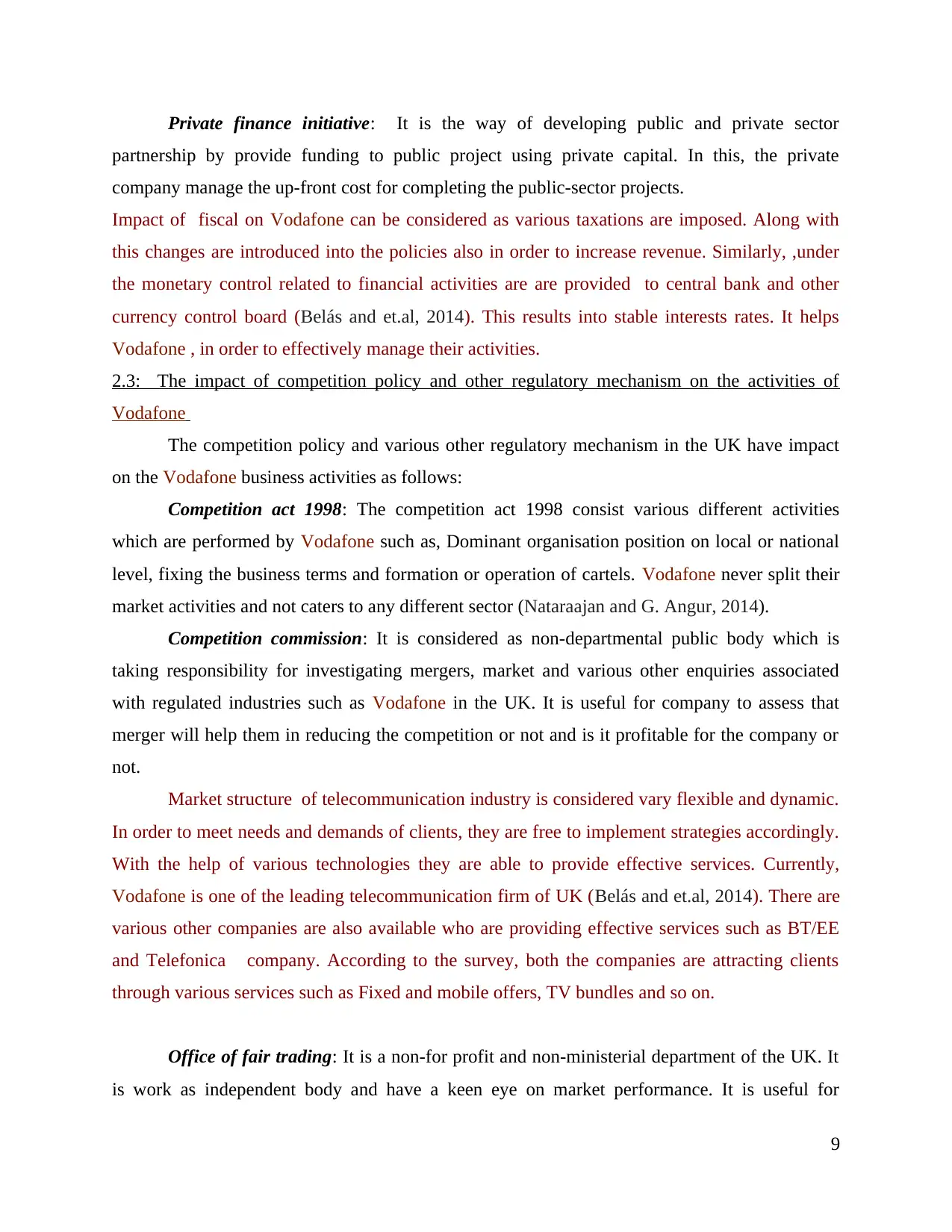
Private finance initiative: It is the way of developing public and private sector
partnership by provide funding to public project using private capital. In this, the private
company manage the up-front cost for completing the public-sector projects.
Impact of fiscal on Vodafone can be considered as various taxations are imposed. Along with
this changes are introduced into the policies also in order to increase revenue. Similarly, ,under
the monetary control related to financial activities are are provided to central bank and other
currency control board (Belás and et.al, 2014). This results into stable interests rates. It helps
Vodafone , in order to effectively manage their activities.
2.3: The impact of competition policy and other regulatory mechanism on the activities of
Vodafone
The competition policy and various other regulatory mechanism in the UK have impact
on the Vodafone business activities as follows:
Competition act 1998: The competition act 1998 consist various different activities
which are performed by Vodafone such as, Dominant organisation position on local or national
level, fixing the business terms and formation or operation of cartels. Vodafone never split their
market activities and not caters to any different sector (Nataraajan and G. Angur, 2014).
Competition commission: It is considered as non-departmental public body which is
taking responsibility for investigating mergers, market and various other enquiries associated
with regulated industries such as Vodafone in the UK. It is useful for company to assess that
merger will help them in reducing the competition or not and is it profitable for the company or
not.
Market structure of telecommunication industry is considered vary flexible and dynamic.
In order to meet needs and demands of clients, they are free to implement strategies accordingly.
With the help of various technologies they are able to provide effective services. Currently,
Vodafone is one of the leading telecommunication firm of UK (Belás and et.al, 2014). There are
various other companies are also available who are providing effective services such as BT/EE
and Telefonica company. According to the survey, both the companies are attracting clients
through various services such as Fixed and mobile offers, TV bundles and so on.
Office of fair trading: It is a non-for profit and non-ministerial department of the UK. It
is work as independent body and have a keen eye on market performance. It is useful for
9
partnership by provide funding to public project using private capital. In this, the private
company manage the up-front cost for completing the public-sector projects.
Impact of fiscal on Vodafone can be considered as various taxations are imposed. Along with
this changes are introduced into the policies also in order to increase revenue. Similarly, ,under
the monetary control related to financial activities are are provided to central bank and other
currency control board (Belás and et.al, 2014). This results into stable interests rates. It helps
Vodafone , in order to effectively manage their activities.
2.3: The impact of competition policy and other regulatory mechanism on the activities of
Vodafone
The competition policy and various other regulatory mechanism in the UK have impact
on the Vodafone business activities as follows:
Competition act 1998: The competition act 1998 consist various different activities
which are performed by Vodafone such as, Dominant organisation position on local or national
level, fixing the business terms and formation or operation of cartels. Vodafone never split their
market activities and not caters to any different sector (Nataraajan and G. Angur, 2014).
Competition commission: It is considered as non-departmental public body which is
taking responsibility for investigating mergers, market and various other enquiries associated
with regulated industries such as Vodafone in the UK. It is useful for company to assess that
merger will help them in reducing the competition or not and is it profitable for the company or
not.
Market structure of telecommunication industry is considered vary flexible and dynamic.
In order to meet needs and demands of clients, they are free to implement strategies accordingly.
With the help of various technologies they are able to provide effective services. Currently,
Vodafone is one of the leading telecommunication firm of UK (Belás and et.al, 2014). There are
various other companies are also available who are providing effective services such as BT/EE
and Telefonica company. According to the survey, both the companies are attracting clients
through various services such as Fixed and mobile offers, TV bundles and so on.
Office of fair trading: It is a non-for profit and non-ministerial department of the UK. It
is work as independent body and have a keen eye on market performance. It is useful for
9
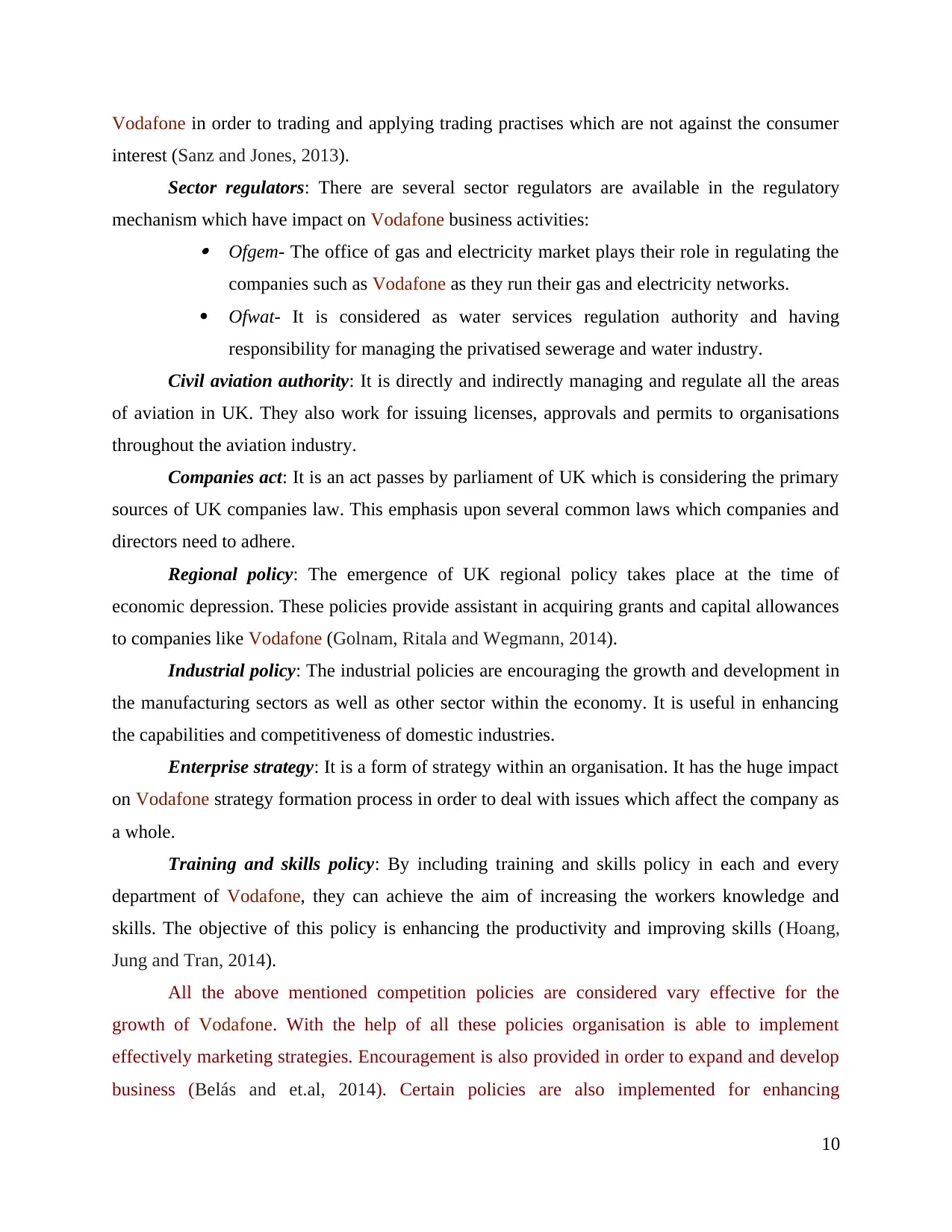
Vodafone in order to trading and applying trading practises which are not against the consumer
interest (Sanz and Jones, 2013).
Sector regulators: There are several sector regulators are available in the regulatory
mechanism which have impact on Vodafone business activities:
Ofgem- The office of gas and electricity market plays their role in regulating the
companies such as Vodafone as they run their gas and electricity networks.
Ofwat- It is considered as water services regulation authority and having
responsibility for managing the privatised sewerage and water industry.
Civil aviation authority: It is directly and indirectly managing and regulate all the areas
of aviation in UK. They also work for issuing licenses, approvals and permits to organisations
throughout the aviation industry.
Companies act: It is an act passes by parliament of UK which is considering the primary
sources of UK companies law. This emphasis upon several common laws which companies and
directors need to adhere.
Regional policy: The emergence of UK regional policy takes place at the time of
economic depression. These policies provide assistant in acquiring grants and capital allowances
to companies like Vodafone (Golnam, Ritala and Wegmann, 2014).
Industrial policy: The industrial policies are encouraging the growth and development in
the manufacturing sectors as well as other sector within the economy. It is useful in enhancing
the capabilities and competitiveness of domestic industries.
Enterprise strategy: It is a form of strategy within an organisation. It has the huge impact
on Vodafone strategy formation process in order to deal with issues which affect the company as
a whole.
Training and skills policy: By including training and skills policy in each and every
department of Vodafone, they can achieve the aim of increasing the workers knowledge and
skills. The objective of this policy is enhancing the productivity and improving skills (Hoang,
Jung and Tran, 2014).
All the above mentioned competition policies are considered vary effective for the
growth of Vodafone. With the help of all these policies organisation is able to implement
effectively marketing strategies. Encouragement is also provided in order to expand and develop
business (Belás and et.al, 2014). Certain policies are also implemented for enhancing
10
interest (Sanz and Jones, 2013).
Sector regulators: There are several sector regulators are available in the regulatory
mechanism which have impact on Vodafone business activities:
Ofgem- The office of gas and electricity market plays their role in regulating the
companies such as Vodafone as they run their gas and electricity networks.
Ofwat- It is considered as water services regulation authority and having
responsibility for managing the privatised sewerage and water industry.
Civil aviation authority: It is directly and indirectly managing and regulate all the areas
of aviation in UK. They also work for issuing licenses, approvals and permits to organisations
throughout the aviation industry.
Companies act: It is an act passes by parliament of UK which is considering the primary
sources of UK companies law. This emphasis upon several common laws which companies and
directors need to adhere.
Regional policy: The emergence of UK regional policy takes place at the time of
economic depression. These policies provide assistant in acquiring grants and capital allowances
to companies like Vodafone (Golnam, Ritala and Wegmann, 2014).
Industrial policy: The industrial policies are encouraging the growth and development in
the manufacturing sectors as well as other sector within the economy. It is useful in enhancing
the capabilities and competitiveness of domestic industries.
Enterprise strategy: It is a form of strategy within an organisation. It has the huge impact
on Vodafone strategy formation process in order to deal with issues which affect the company as
a whole.
Training and skills policy: By including training and skills policy in each and every
department of Vodafone, they can achieve the aim of increasing the workers knowledge and
skills. The objective of this policy is enhancing the productivity and improving skills (Hoang,
Jung and Tran, 2014).
All the above mentioned competition policies are considered vary effective for the
growth of Vodafone. With the help of all these policies organisation is able to implement
effectively marketing strategies. Encouragement is also provided in order to expand and develop
business (Belás and et.al, 2014). Certain policies are also implemented for enhancing
10
⊘ This is a preview!⊘
Do you want full access?
Subscribe today to unlock all pages.

Trusted by 1+ million students worldwide
1 out of 24
Related Documents
Your All-in-One AI-Powered Toolkit for Academic Success.
+13062052269
info@desklib.com
Available 24*7 on WhatsApp / Email
![[object Object]](/_next/static/media/star-bottom.7253800d.svg)
Unlock your academic potential
Copyright © 2020–2026 A2Z Services. All Rights Reserved. Developed and managed by ZUCOL.





